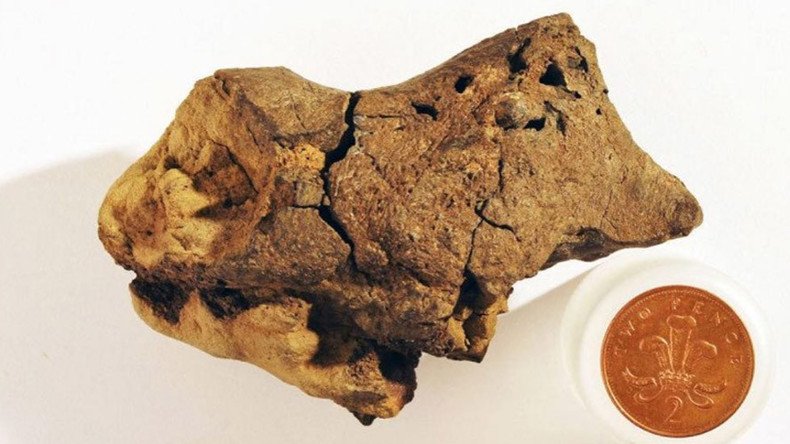133m year old dinosaur brain discovered on UK beach

A discovery made on a beach in the UK ten years ago has turned out to be the world’s first preserved dinosaur brain. The 133 million year old fossil preserved in a bog may prove that dinosaurs had exceptionally large brains.
Found on a beach in Sussex, the fossil’s discoverer Jamie Hiscocks said he “always believed [he] had something special” after stumbling across the brown pebble, according to the Independent.
#southernrail admit world's 1st dinosaur brain was discovered in lost property office
— Train Guard (@ConductorSam) October 28, 2016
Reported missing 6m years ago pic.twitter.com/qywdVPgiW4
Believed to be from a species similar to an Iguanodon dinosaur it was sent to the late Professor Martin Brasier of Oxford University to study, with the findings published by The Geological Society this week.
‘Blood vessels’ retrieved from 80mn-yo dinosaur fossil – studyhttps://t.co/wYbkFJPSAvpic.twitter.com/1THVRE9ja9
— RT (@RT_com) December 4, 2015
Meninges, tissue that surrounds the brain, along with the remains of capillaries and cortical tissues were detected by a scanning electron microscope, indicating that Hiscocks had discovered the first ever fossil of a dinosaur brain.
A bog, similar to a swamp, is believed to be responsible for the preservation of the brain due to its highly-acidic low-oxygen water.
Unlike reptiles, whose brains are cigar shaped with the the rest of the space in the skull used for blood vessels and sinuses, the fossil appears to show the brain pressing directly against the skull.
Weird frozen carcass found in Siberia could be 252mn yo dinosaur https://t.co/sXO8HQkQE8pic.twitter.com/2K7mTibPLl
— RT (@RT_com) August 11, 2016
This could mean that dinosaurs had a larger brain than previously thought, but one researcher said it is more likely due to the dinosaur being preserved upside down, with the brain collapsing on itself as it decayed.
“Of course, it's entirely possible that dinosaurs had bigger brains than we give them credit for, but we can't tell from this specimen alone,” said Dr David Norman, one of the researchers involved in the study.
Norman said that he hopes the discovery leads to more fossilised brains being uncovered, allowing scientists to draw more conclusions from a larger sample.
X-ray scans of 'exceptional' #dinosaur skeleton shed new light on 200mn-yo fossil (PHOTOS) https://t.co/VEecHIW9azpic.twitter.com/iVegjI7hsP
— RT (@RT_com) July 28, 2016
The original discoverer Hiscocks co-authored the report, adding a tribute to the late Professor Brasier in it.
“In his initial email to me, Martin asked if I’d ever heard of dinosaur brain cells being preserved in the fossil record. I knew exactly what he was getting at,” Hiscocks said. “I was amazed to hear this coming from a world renowned expert like him.”












